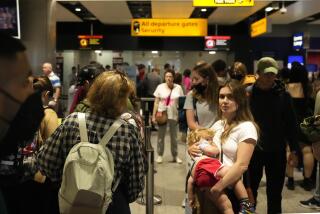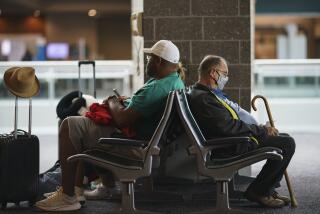Advice for Breathing Easy
- Share via
Before his patients with asthma embark on any long-distance travel, Dr. Michael Kaplan has a suggestion: Check in with him about their itinerary.
Based on the patient’s travel plans, their health status and factors such as the climate and the season at the destination, Kaplan gives them a game plan. Sending off patients with written instructions is now commonly done by asthma specialists, says Kaplan, chief of allergy at Kaiser Permanente, Los Angeles.
The game plans are very specific, tailored to each patient. “If patients have had severe asthma that requires corticosteroid medications, we provide them with emergency medicine with specific instructions on when and how to take it,” says Kaplan, who is also a UCLA associate clinical professor of pediatrics.
Patients who use a peak flow meter, an instrument to measure lung function, are advised to take it along on trips and, if the numbers fall below a certain point, to take specific medicines.
An estimated 9 million to 12 million Americans have asthma, according to the Asthma and Allergy Foundation of America, including at least 2.7 million children under age 18. It is the most common chronic childhood disease, according to the foundation. A lung disease, asthma is marked by shortness of breath, coughing, wheezing and tightness in the chest, reversible by medications. During an acute attack, the muscles around the bronchial tubes tighten. There is mucus production and swelling.
But for both children and adults with asthma, traveling has become somewhat easier in recent years due to a number of factors, Kaplan says. Newer medicines, including cromolyn sodium (Intal, Tilade) and corticosteroids such as beclomethasone (Vanceril, Beclovent) work to stabilize the asthma, decreasing the number of acute attacks. There has been increased patient education and physician education about the condition and the need to treat symptoms promptly.
The use of a nebulizer, a medicine delivery system, can help stabilize asthma in young children and can be very helpful in managing acute attacks, Kaplan says. Whether powered by electricity or battery, the system works like a kind of electronic air compressor, making a mist out of liquid medicine.
While nebulizers have been widely available for the past 10 years, their use has become more widespread in the past five, Kaplan finds. (If taking a nebulizer overseas, Kaplan warns patients, be sure it will work on European current.)
Even with these advances, however, certain patients are not candidates for long-distance travel. Patients whose asthma is interfering with normal daily activities should postpone travel, he says. Those with significant asthma, even if it is under control, should not travel to remote areas, where medical care is not readily accessible, Kaplan added.
Those who are cleared for travel should educate themselves before departure.
“Airplane travel is the hardest,” Kaplan cautions his patients. “It’s not so much the altitude as being in an enclosed space for a long period of time. It’s often not well ventilated and the air is dry, which is not good for asthmatics.”
Asthmatics who also have problems with allergies (about 50%-75% of children, fewer adults) should take into account allergens prevalent at the destination, says Sarah Kaluzny-Petroff, a spokeswoman for the American Academy of Allergy & Immunology. To find out which allergens are active at specific locations, call the academy to order its pollen calendar (800-822-2762).
Among other ways that those with asthma can ensure a more healthful trip, suggested by Kaplan, the American Academy of Allergy & Immunology and the Asthma and Allergy Foundation of America:
* Get a nonsmoking hotel room.
* Bring your own pillow if possible. Or bring a dustproof cover.
* Pack extra medicines and inhalers.
* Get a list of the names (generic and brand) and doses of medicines taken.
* Pack a portable air cleaner for smoky hotel rooms if no-smoking rooms aren’t available.
* If traveling by auto, try to eliminate mold and mildew from the car’s ventilating and air conditioning system before departure.
Travelers with other questions can call several toll-free telephone lines for information and referrals: the American Academy of Allergy & Immunology, (800) 822-2762; the Asthma and Allergy Foundation of America, (800) 7-ASTHMA, and the Asthma & Allergy Foundation of America Los Angeles chapter, (800) 624-0044, 9 a.m. to 5 p.m. weekdays.
The Healthy Traveler appears the second and fourth week of every month.
More to Read
Sign up for Essential California
The most important California stories and recommendations in your inbox every morning.
You may occasionally receive promotional content from the Los Angeles Times.













